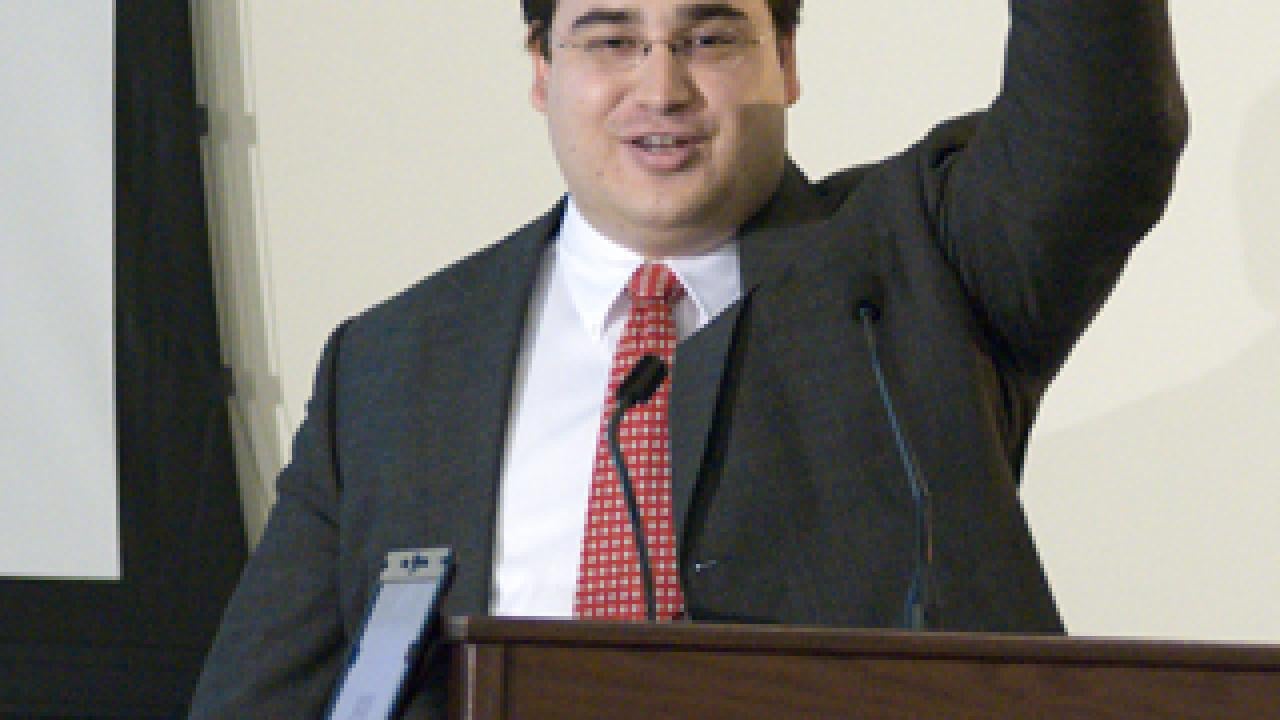A technology that could allow cancer specialists to better determine the most effective chemotherapy treatment for a given patient won the $10,000 first prize in the 11th annual Big Bang! Business Plan Competition at the University of California, Davis. The contest is run by MBA students in the Graduate School of Management.
A money-saving innovation that decreases the amount of rare and expensive platinum needed to make fuel cells won both the second-place $3,000 prize and the audience-selected People’s Choice award of $2,000.
“This personalizes chemotherapy,” said Paul Henderson, an assistant adjunct professor of hematology and oncology at UC Davis Cancer Center and CEO of the winning company, Accelerated Medical Diagnostics. About 70 percent of lung cancer patients, for example, get no benefit from chemotherapy, he explained in his presentation, “and they endure these terrible side effects.” The innovation, based on a technology called accelerator mass spectrometry, can trace a small dose of an anti-cancer drug in a patient prior to treatment, enabling doctors to determine if the treatment will work before administering a full dose. The approach could save billions of dollars in medical costs for ineffective treatments, and spare patients unnecessary side effects.
“Our goal is to get the right therapy for the right tumor,” Henderson said. The procedure is now in early clinical testing in bladder and lung cancer patients.
Students helped Henderson obtain patents and develop a business plan. He said the technology could be on the market in two to four years, pending regulatory approval. He estimates that each test would cost the insurer or patient about $4,000 each.
ECO Catalytics, which has developed a nearly platinum-free fuel-cell catalyst material, won not only second prize, but the People’s Choice award, selected by a vote of the audience of about 120 at the final awards presentation. The presentation took place Thursday evening (May 19) at the UC Davis Conference Center.
The ECO Catalytics technology reduces by 95 percent the amount of high-cost platinum used in electricity-generating fuel cells, potentially reducing fuel cell costs by a third. Fuel cells are used in various industries, including as back-up power for cell-phone towers, in forklifts used by retailer Walmart and others, and in the U.S. military, explained John-Paul Farsight, the UC Davis MBA student who delivered the presentation. The team of UC Davis MBA students and campus researchers also recently won third place in the 2011 Walmart Better Living Business Plan Challenge, which honors student entrepreneurship in environmental sustainability. That prize was worth $5,000 in seed funding for the team.
UC Davis School of Management Dean Steven Currall said the competition epitomizes what the school teaches its entrepreneurial students. “Students learn to solicit funding, market their product and engage customers,” he said. “The Big Bang! exemplifies what happens when you mix cutting-edge technology, a solid business plan and prize money. It is the confluence of our students' ingenuity, campuswide partnerships and the region’s business community.”
The competition brings together interdisciplinary teams of students, university researchers and faculty, with mentors from the region’s business community. Some of Northern California’s largest employers, venture capitalists and law firms provide the prize money, coaching and volunteer judges. The Big Bang! has produced many teams that have become successful start-ups since its founding in 2000.
This is the second year Big Bang! organizers welcomed top teams from the Sacramento State College of Business Administration, which had a student on the winning team, and the Sacramento Entrepreneurship Academy.
Farsight said he and his team are excited to develop something that is both economically solid and ecological.
Although developing the fuel-cell technology commercially will cost millions at the outset, there is a promising market for the product, Farsight said. “The amount of platinum in the world would only fill an Olympic-size swimming pool up to a little above your ankles. And that’s all there is. That is not sustainable,” he said.
Other final round presenters included KardiaGenics, a biotech company developing a therapeutic treatment for heart failure using a proprietary screening technology; Fliksense, a company that licenses software technology to online video providers that enables them to offer better searches of video content; and Zinapt, which has developed a platform that could accurately detect infectious diseases for faster diagnosis at a lower price. Additional information on the competition and the finalist teams is available at http://bigbang.gsm.ucdavis.edu/winners.php.
About the UC Davis Graduate School of Management
Established in 1981, the UC Davis Graduate School of Management is consistently ranked among the premier business schools in the United States and internationally. The school has nearly 600 MBA students enrolled in Daytime MBA and Working Professional MBA programs on the UC Davis campus, in Sacramento and in the San Francisco Bay Area. U.S. News & World Report ranks UC Davis among the top 6 percent of MBA programs in the nation. The Economist ranks the school’s faculty quality No. 3 in the world. For more information, visit http://www.gsm.ucdavis.edu.
Media Resources
Karen Nikos-Rose, Research news (emphasis: arts, humanities and social sciences), 530-219-5472, kmnikos@ucdavis.edu
Tim Akin, Graduate School of Management, 530-752-7362, tmakin@ucdavis.edu
